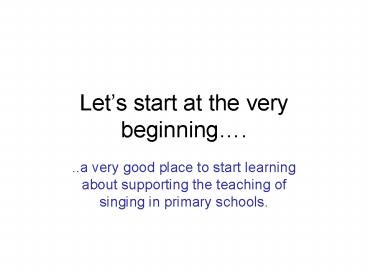Lets start at the very beginning' - PowerPoint PPT Presentation
1 / 14
Title:
Lets start at the very beginning'
Description:
Banana Splits A & C black. Range of A & C Black songbooks ... dozens of intricate dance movements calling for incredible muscular control. ... – PowerPoint PPT presentation
Number of Views:22
Avg rating:3.0/5.0
Title: Lets start at the very beginning'
1
Lets start at the very beginning.
- ..a very good place to start learning about
supporting the teaching of singing in primary
schools.
2
Key Questions addressed in this module
- Key questions
- What is there to think about in learning how to
teach singing in the primary school? - What types of song shall we sing?
- What does progression in singing look like?
- How do you teach a song?
- What songs should I teach?
- How do you know if the singing is good?
- What are the issues to be aware of?
3
Resources
- Web based resources
- http//singup.org/
- http//www.singbook.org.uk
- www.teachers.tv
- http//www.oxfam.org.uk/coolplanet/oxjam/index.htm
4
Materials in print
- Sing for Pleasure Songbooks (SfP)
- Junior Songscapes Lin Marsh (Faber Music)
- Singing Sherlock Val Whitclock Shirley Court
(Boosey Hawkes) - Banana Splits A C black
- Range of A C Black songbooks
- High Low Dolly Pepper Veronica Clark (A C
Black) - Okki Tokki Unga (A C Black)
- 65 Songs Children Sing Michael Stocks (Humming
Bird) - Voiceworks Junior voiceworks (Oxford University
Press) - Voiceplay Alison Street Linda Bance (OUP)
- Young Voiceworks Jo McNally (OUP)
- How do I keep from singing British Kodaly
Academy - Primary Music Today (Peacock Press)
- Music Education Research - Routledge
- British Journal of Music Education Cambridge
Journals
5
Whats involved in teaching singing?
6
Appraising your singing
- What were the qualities of your singing? For
example - Does the phrasing support musical sense and
overall meaning? - Is the intonation good?
- Is there a relaxed and natural tone?
- In what way were tone and breath control
supported by posture? - Can you understand the words?
- Does any one voice stand out?
- Is the performance convincing?
- Was there an attempt at colouring the words
through the a variety of dynamics, tempo changes
and other expressive devices?
7
Teachers TV
- Watch the following extract. Make notes about
- warming-up the voice.
- use of hand movements to indicate pitch,
- use of call response
- teaching small chunks
- appropriate tempo for teaching
- use of body movements
- opportunities for the children to be creative.
8
Teaching a song
- Know the song thoroughly..
- Teach chunks by call and response.
- Decide on a starting note
- Sing the entire song to model what is to be
learnt. - Model the dynamics and expressive elements as you
sing. - Dont talkjust sing!
- Teach the words at the same time as the music
- Rehearse the song using call response.
- Gradually build the chunk together.
- For longer songs, learn v1 by call response
then use a song sheet for the remaining verses. - Use CDs wisely. They are a resource for teachers,
not a replacement. - Listen carefully, and make sure you are happy
with the quality of the singing.
9
Sing up
10
Sing Book
11
Oxfam
12
How Musical is Man? (Blacking, 1974)
- Before you discuss this, read the following
regarding the Anang Ibibo people of Nigeria, from
Messenger, 1958. - Does this fit with your understanding of what it
means to be musical?
We were constantly amazed at the musical
abilities displayed by these people, especially
by the children who, before the age of five, can
sing hundreds of songs, both individually and in
choral groups and, in addition, are able to play
several percussion instruments and have learned
dozens of intricate dance movements calling for
incredible muscular control. We searched in vain
for the non-musical person.
13
Consider these questions
- Is it remarkable that all people in a culture
should be considered musical? - Is this a specially gifted race? Is it in the
genes? - What does this say about how musical humankind
(man) is? - What musical skills might we expect British
children to develop? - What songs would you expect children to know?
- What nursery rhymes do you know?
- Are we all musical? Can everybody sing? Does it
matter if we dont make up our mind on this?
14
Why bother anyway?
- The current primary curriculum is often regarded
as being overloaded and driven by content. For
this reason, some may argue that singing is a
pointless exercise that takes up too much time.
Consider your response to this, and note in what
ways singing contributes to children's
development in the following areas
- Physical development
- Cognitive development
- Social development
- Cultural development
- Spiritual development
- Well-being and happiness

